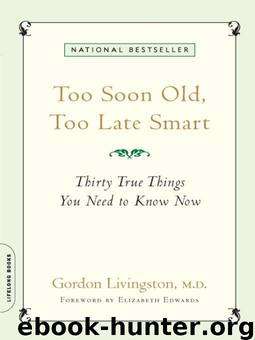Too Soon Old, Too Late Smart: Thirty True Things You Need to Know Now by Livingston Gordon

Author:Livingston, Gordon [Livingston, Gordon]
Language: eng
Format: epub
ISBN: 9780786732265
Publisher: Perseus Books Group
Published: 2009-04-29T04:00:00+00:00
15.
Only bad things happen quickly.
One of the common fantasies entertained by those seeking change in their lives is that it can be rapidly achieved. Once we “know” what to do it appears that we ought to be able simply to do it. That these sudden transformations are rare is a source of puzzlement to many.
The most familiar behaviors that are resistant to change are those that involve addictions of some sort: drinking, smoking, drug dependency. Here we postulate some chemical process at work that complicates our efforts to do what we know is best for us. The presence of withdrawal symptoms as we try to relinquish the unwanted substance confirms our belief that we are in the grip of a physical craving that overcomes our willpower and requires special programs to help us defeat it.
How about other apparent addictions like overeating and gambling (sex and shopping have recently been added)? Here the dependency is less obviously chemical, but anyone who has tried to control food intake or the desire to place a bet will tell you how difficult this can be.
What is at work here is the psychological power of habit. The characteristics that render each of us unique are seldom the products of rational choice. Sometimes, of course, we do choose to develop healthy practices. Regular exercise can be a life-enhancing routine. Our bad habits, however, tend to insinuate themselves over time and become extremely resistant to change, even when they threaten to destroy our lives.
Among these life-altering maladaptive behaviors are our habitual ways of relating to others. The traits that we display toward other people are major determinants of how successful we are in forming and sustaining relationships. Most of these elements of our personal “style” are not the products of conscious choice and are either inborn or were formed by our early experience with our families. Because they exist below the level of our conscious minds, they are resistant to change, even when they are evidently not working for us.
It is obvious that any process directed at changing, even a little, our well-established patterns of thinking and behaving is going to be an extended one and will involve efforts at gaining insight, reevaluating behaviors, and trying new approaches. Under the best of circumstances, such change takes time.
The same is true for all the other personal characteristics and habitual patterns that don’t work for us but that we keep repeating: impulsivity, hedonism, narcissism, irritability, and the need to control those around us. To imagine that such traits can be changed overnight or as soon as we become aware of them is to discount the well-established strength of habit and the slowness with which we translate new knowledge into behavior.
When we think about the things that alter our lives in a moment, nearly all of them are bad: phone calls in the night, accidents, loss of jobs or loved ones, conversations with doctors bearing awful news. In fact, apart from a last-second touchdown, unexpected inheritance, winning the lottery, or a visitation from God, it is hard to imagine sudden good news.
Download
This site does not store any files on its server. We only index and link to content provided by other sites. Please contact the content providers to delete copyright contents if any and email us, we'll remove relevant links or contents immediately.
The remains of the day by Kazuo Ishiguro(8974)
Tools of Titans by Timothy Ferriss(8365)
Giovanni's Room by James Baldwin(7326)
The Black Swan by Nassim Nicholas Taleb(7106)
Inner Engineering: A Yogi's Guide to Joy by Sadhguru(6785)
The Way of Zen by Alan W. Watts(6600)
Asking the Right Questions: A Guide to Critical Thinking by M. Neil Browne & Stuart M. Keeley(5758)
The Power of Now: A Guide to Spiritual Enlightenment by Eckhart Tolle(5752)
The Six Wives Of Henry VIII (WOMEN IN HISTORY) by Fraser Antonia(5497)
Astrophysics for People in a Hurry by Neil DeGrasse Tyson(5182)
Housekeeping by Marilynne Robinson(4436)
12 Rules for Life by Jordan B. Peterson(4299)
Double Down (Diary of a Wimpy Kid Book 11) by Jeff Kinney(4261)
Ikigai by Héctor García & Francesc Miralles(4246)
The Ethical Slut by Janet W. Hardy(4242)
Skin in the Game by Nassim Nicholas Taleb(4239)
The Art of Happiness by The Dalai Lama(4125)
Skin in the Game: Hidden Asymmetries in Daily Life by Nassim Nicholas Taleb(3989)
Walking by Henry David Thoreau(3953)
